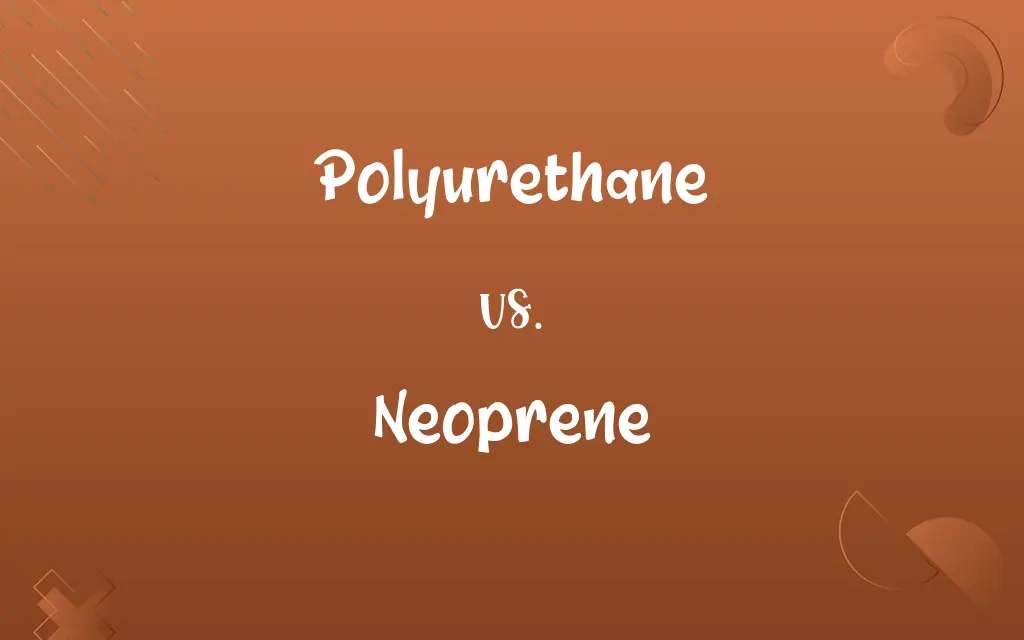Polyurethane vs. Neoprene: Know the Difference

By Shumaila Saeed || Updated on December 25, 2023
Polyurethane is a versatile polymer used in foams, elastomers, and coatings; Neoprene is a synthetic rubber known for its chemical stability and flexibility.

Key Differences
Polyurethane is a polymer composed of organic units joined by urethane links, often used in foam products and surface coatings. Neoprene, on the other hand, is a synthetic rubber developed as an oil-resistant substitute for natural rubber, commonly used in wetsuits and gaskets.
Shumaila Saeed
Dec 01, 2023
Polyurethane is known for its durability, resistance to abrasion, and flexibility, making it ideal for furniture, automotive interiors, and footwear. Neoprene offers excellent chemical stability and maintains flexibility over a wide temperature range, making it suitable for industrial and automotive applications.
Shumaila Saeed
Dec 01, 2023
In terms of thermal insulation, Polyurethane foams are widely used in insulation panels and refrigerators due to their high insulation properties. Neoprene, being a type of rubber, provides moderate insulation but excels in waterproofing and is commonly used in aquatic gear.
Shumaila Saeed
Dec 01, 2023
Polyurethane can be customized in varying levels of hardness and rigidity, which is advantageous in the manufacture of a wide range of products. Neoprene, while less versatile in hardness adjustments, stands out for its resistance to oils and chemicals.
Shumaila Saeed
Dec 01, 2023
Environmental impact and recyclability of both materials also differ; Polyurethane recycling is challenging due to its chemical structure, whereas Neoprene, though not easily recyclable, is often repurposed in various applications.
Shumaila Saeed
Dec 01, 2023
ADVERTISEMENT
Comparison Chart
Thermal Insulation
High, used in insulating panels
Moderate, used in aquatic gear
Shumaila Saeed
Dec 01, 2023
Chemical Resistance
Good resistance to abrasion, less to chemicals
Excellent resistance to oils and chemicals
Shumaila Saeed
Dec 01, 2023
ADVERTISEMENT
Polyurethane and Neoprene Definitions
Polyurethane
A versatile plastic used in various manufacturing processes.
The car's dashboard is made from a sturdy form of polyurethane.
Shumaila Saeed
Dec 01, 2023
Neoprene
A material resistant to oil, heat, and weathering, used in industrial applications.
Neoprene gaskets are used in engines due to their oil resistance.
Shumaila Saeed
Dec 01, 2023
Polyurethane
A synthetic material known for its resistance to abrasion and impact.
Polyurethane coatings protect the wooden floors from scratches.
Shumaila Saeed
Dec 01, 2023
Neoprene
A synthetic rubber known for its chemical and thermal stability.
The diver's wetsuit, made of neoprene, provided thermal protection underwater.
Shumaila Saeed
Dec 01, 2023
Polyurethane
A durable polymer used in flexible and rigid foams, elastomers, and coatings.
The sofa's cushions are made of polyurethane foam for added comfort.
Shumaila Saeed
Dec 01, 2023
ADVERTISEMENT
Neoprene
A water-resistant rubber used in aquatic and outdoor gear.
Her waterproof jacket was reinforced with neoprene for extra protection.
Shumaila Saeed
Dec 01, 2023
Polyurethane
A chemical compound used in adhesives, sealants, and varnishes.
The wood was sealed with a polyurethane varnish for durability.
Shumaila Saeed
Dec 01, 2023
Neoprene
A cushioning material in protective cases and covers.
The laptop sleeve was crafted from neoprene for shock absorption.
Shumaila Saeed
Dec 01, 2023
Polyurethane
An adaptable material used in textiles, insulation, and automotive parts.
Polyurethane fibers are used to make stretchable and comfortable fabrics.
Shumaila Saeed
Dec 01, 2023
Neoprene
A flexible and durable elastomer used in medical and athletic supports.
The knee brace was made from neoprene for flexibility and support.
Shumaila Saeed
Dec 01, 2023
Polyurethane
Any of various thermoplastic isocyanate polymers, widely varying in flexibility, used in tough chemical-resistant coatings, adhesives, and foams.
Shumaila Saeed
Oct 19, 2023
Neoprene
A synthetic rubber produced by polymerization of chloroprene and used in weather-resistant products, adhesives, shoe soles, sportswear, paints, and rocket fuels.
Shumaila Saeed
Oct 19, 2023
Polyurethane
(organic chemistry) Any of various polymeric resins containing urethane links; used in very many industrial and domestic applications.
Shumaila Saeed
Oct 19, 2023
Neoprene
A synthetic rubber, a polymer of chloroprene, commonly used in wetsuits, laptop sleeves, orthopedic braces, electrical insulation, liquid and sheet-applied elastomeric membranes and flashings, car fan belts, etc.
Shumaila Saeed
Oct 19, 2023
Polyurethane
Any polymer containing [-NH.CO.O-] linkages; such polymers are much used as the basis of light but rigid foams for packaging (polyurethane foam) and for hard coatings, as on floors.
Shumaila Saeed
Oct 19, 2023
Neoprene
A synthetic rubber that is resistant to oils and aging; used in waterproof products
Shumaila Saeed
Oct 19, 2023
Polyurethane
Any of various polymers containing the urethane radical; a wide variety of synthetic forms are made and used as adhesives or plastics or paints or rubber
Shumaila Saeed
Oct 19, 2023
Repeatedly Asked Queries
What is polyurethane commonly used for?
It's used in furniture, insulation, automotive parts, and coatings.
Shumaila Saeed
Dec 01, 2023
Can neoprene withstand high temperatures?
Yes, it's resistant to heat and maintains its flexibility.
Shumaila Saeed
Dec 01, 2023
Are polyurethane products environmentally friendly?
They can be challenging to recycle and vary in environmental impact.
Shumaila Saeed
Dec 01, 2023
Is neoprene good for insulation?
It provides moderate insulation and is excellent for waterproofing.
Shumaila Saeed
Dec 01, 2023
How long does polyurethane last?
It's highly durable and can last for many years depending on use and conditions.
Shumaila Saeed
Dec 01, 2023
Is polyurethane waterproof?
It has water-resistant properties but is not entirely waterproof.
Shumaila Saeed
Dec 01, 2023
How is neoprene made?
It's a synthetic rubber produced through polymerization of chloroprene.
Shumaila Saeed
Dec 01, 2023
What are the advantages of polyurethane in textiles?
It offers flexibility, durability, and resistance to wear and tear.
Shumaila Saeed
Dec 01, 2023
Is neoprene resistant to chemicals?
Yes, it's known for its excellent chemical resistance.
Shumaila Saeed
Dec 01, 2023
Can neoprene be recycled?
It's difficult to recycle but can be repurposed for various applications.
Shumaila Saeed
Dec 01, 2023
Can polyurethane be used outdoors?
Yes, specially formulated polyurethane is used for outdoor applications.
Shumaila Saeed
Dec 01, 2023
What makes neoprene unique?
Its balance of flexibility, chemical stability, and thermal resistance.
Shumaila Saeed
Dec 01, 2023
Can neoprene cause allergies?
Some people may be allergic to neoprene or chemicals used in its production.
Shumaila Saeed
Dec 01, 2023
Are there different types of polyurethane?
Yes, it varies from flexible and rigid foams to coatings and adhesives.
Shumaila Saeed
Dec 01, 2023
Can neoprene be used in medical applications?
Yes, it's used in braces and supports for its flexibility and comfort.
Shumaila Saeed
Dec 01, 2023
How does polyurethane react to fire?
It can be flammable but is often treated with fire retardants.
Shumaila Saeed
Dec 01, 2023
What are the disadvantages of neoprene?
It's less versatile than some materials and can degrade in sunlight.
Shumaila Saeed
Dec 01, 2023
Is polyurethane safe for health?
Generally safe, but its raw materials can be toxic during manufacturing.
Shumaila Saeed
Dec 01, 2023
Is polyurethane good for sound insulation?
Yes, its foam form is effective in soundproofing applications.
Shumaila Saeed
Dec 01, 2023
Is neoprene suitable for all skin types?
While generally safe, some may experience skin irritation or allergies.
Shumaila Saeed
Dec 01, 2023
Share this page
Link for your blog / website
HTML
Link to share via messenger
About Author
Written by
Shumaila SaeedShumaila Saeed, an expert content creator with 6 years of experience, specializes in distilling complex topics into easily digestible comparisons, shining a light on the nuances that both inform and educate readers with clarity and accuracy.








































































